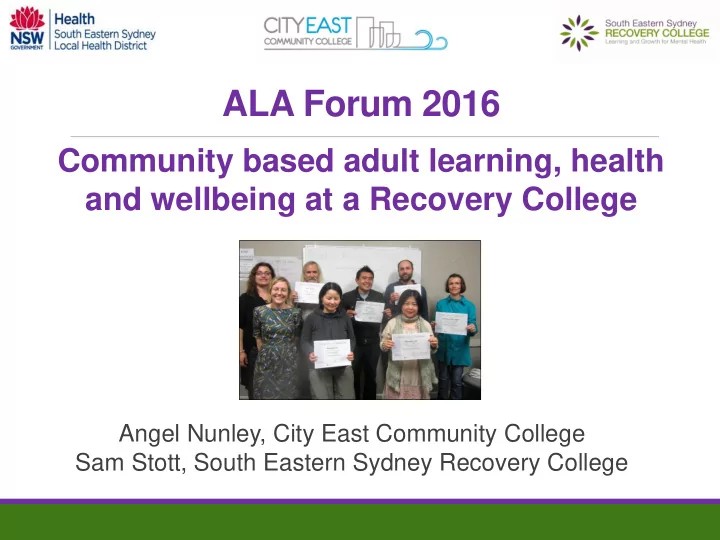

ALA Forum 2016 Community based adult learning, health and wellbeing at a Recovery College Angel Nunley, City East Community College Sam Stott, South Eastern Sydney Recovery College
Recovery College Model Origins A new approach to providing education to people with mental health issues, carers and workers Originated in the United States in the 1990’s; a UK Recovery College established in 2009 Brings together adult education principles, readiness to change theory, health promotion and psychiatric rehabilitation processes 2
Defining Characteristics 1. Educational principles 2. Collaborative 3. Strengths-based 4. Person-centred 5. Progressive 6. Community-facing 7. Inclusive Reference: Julie Repper and Jane McGregor 3
Co-Production Peer and clinical educators working together equitably Power is shared from start to finish Professional and lived experience are equally valued 4
Course Development Process Course Development Agreement Co-Production by Educators Co-Delivery by Educators Co-Learning by Students Co-Evaluation by Researchers 5
International Community of Practice Members from Recovery Colleges in Australia, Canada, USA, Uganda, UK and Ireland A central recovery college ‘hub’ creates a positive atmosphere of learning and connection Courses must be recovery-focused and distinct from psycho-education, group therapy or popular education Mental health service transformation occurs through co-production and co-learning 6
SESRC Objectives Personal • Promote self-determination • Life beyond mental health services Recovery Service • Recovery-oriented service delivery Transformation through co-produced staff training Capacity • Skills and knowledge for consumer Building workforce development • Vocational pathways Employment • Accredited training 7
Adult Education SESRC Transformative Partnerships Learning for Recovery Lived Professional Experience Expertise 8
Partnerships with Community Colleges Both CECC & SGSCC have been partners of the Recovery College since it was established Use of educational language e.g. students, enrolments, courses Both community colleges are members of Recovery College Expert Advisory Committee Courses located in adult education settings Pathways / accredited training 9
SESRC Eligibility and Enrolment Courses are free for: People with mental health issues residing in SESLHD (with whom we develop an individual student learning plan prior to commencement) Their families, carers and support people Staff and volunteers working for SESLHD Staff from our partner organisations A fee-for-service option is also available. 10
SESRC Courses Courses are delivered across the Local Health District including community colleges, a migrant resource centre and mental health services including Recovery College hub 9 terms completed; 772 students; 74 courses CALD courses: Arabic, Cantonese, Greek, Mandarin, Nepalese, Russian and Spanish Nationally accredited courses: Foundation Skills (CECC) & Certificate II Business (SGSCC) 11
SESRC Key Research Outcomes Qualitative and quantitative research including a cost-benefit analysis Focus group themes: Breaking down barriers; reducing stigma; empowering; connecting with others; inspiring hope; moving beyond mental illness Course evaluations: 100% had expectations met; 100% gained valuable knowledge; 100% would recommend course 12
Focus Group Comments “So different to anything experienced before” “Took me to another level in my understanding of recovery” “Connecting with others who have successfully recovered gave me hope that I could recover too ” The Recovery College is “changing lives”, giving back to the consumer “the choice, control, empowerment, strategies and connections to live the life they want” 13
Conclusion For health services: The Recovery College model challenges the traditional way people with a lived experience of mental illness, their carers and clinicians view recovery and provides an opportunity to drive service transformation For adult education providers: The Recovery College model promotes lifelong and life- wide learning as an integral part of recovery from mental distress 14
Questions? City East Community College Phone: (02) 9387 7400 Website: www.cityeastcc.com.au South Eastern Sydney Recovery College Phone: (02) 9113 2981 Website: www.seslhd.health.nsw.gov.au/Recovery_College 15
Recommend
More recommend